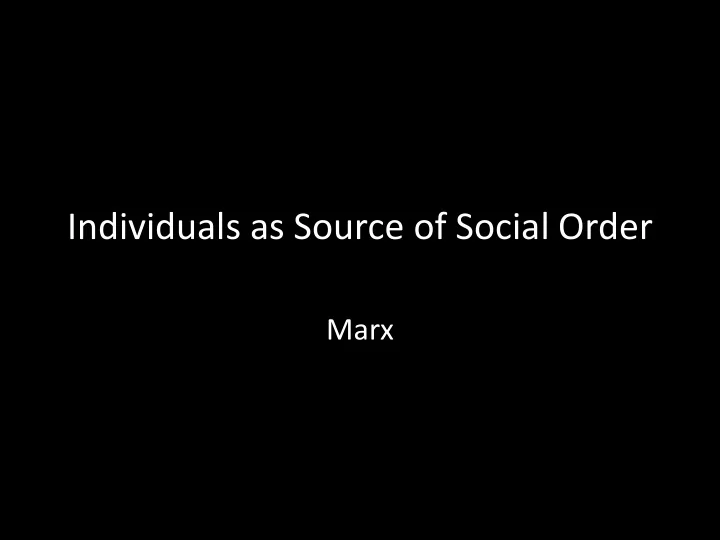

Individuals as Source of Social Order Marx
The Problem • How do humans… – …achieve predictability (COORDINATION) – …overcome urge to self-serve (COOPERATION) • In other words: “what mechanisms lead to coordination and cooperation?”
Ants Do It
Slime Molds Do It
Wolves Do It
How Do They Cooperate and Coordinate?
Communication • Requires common understanding and belief – About things – About others – About concepts – About symbols • With shared meanings we can interpret actions as meaningful, communicate intent, settle on abstract agreements, empathize
Shared Social Meanings
But Where Do Those Come From?
Time Line Karl Marx 1818-1873 George Herber Mead 1863–1931 Émile Durkheim 1858-1917 Ludwick Fleck 1896 – 1961 Dov Cohen contemporary Joe Vandello contemporary 1850 1900 1950
Karl Marx and Social Theory
Karl Marx’s Grave Highgate Cemetery London, England 1818- 1873 Karl Marx’s Birthplace Trier, Germany
Engels’ “Speech at the Graveside of Karl Marx” “that therefore the production of the immediate material means, and consequently the degree of “Just as Darwin discovered the “On the 14th of March, at a economic development attained law of development or organic quarter to three in the afternoon, by a given people or during a nature, so Marx discovered the the greatest living thinker ceased given epoch, form the foundation law of development of human to think. He had been left alone upon which the state institutions, history: the simple fact, hitherto for scarcely two minutes, and the legal conceptions, art, and concealed by an overgrowth of when we came back we found even the ideas on religion, of the ideology, that mankind must first him in his armchair, peacefully people concerned have been of all eat, drink, have shelter and gone to sleep -- but for ever.” evolved, and in the light of which clothing, before it can pursue they politics, science, art, religion, etc.; must, therefore, be explained, instead of vice versa, as had hitherto been the case. http://2.bp.blogspot.com/-fkdsNwQrwRY/T2KcIlZVSuI/AAAAAAAAIo8/C6cI8DEiAv8/s1600/Engels.jpg
Biography cont’d • Father was successful lawyer • Grew up as assimilated Jew, baptized Protestant • Classical Gymnasium • Studied law at Bonn and Berlin • 1841 (age 23) Ph.D. on Pre-Socratic Greek philosophers
Biography cont’d • Radical activities at university kept him from becoming a professor • Started career as journalist/editor • Chased out of Germany 1843, then out of France and Belgium. Ends up settling in London • Meets Engels 1844. They work together for rest of their lives.
Influences • German Philosophy • English Economics • French History Aron (1968, 178):
What does Marx take from Hegel? • Unity of succession of societies • Stages of humankind • Idea that “history hangs together” • Connection of consciousness and history – that there is a “spirit of the times” • Dialectical thinking
How does Marx depart from Hegel? • troubled by Hegel’s approach as “all ideas” – how do we find it in PRACTICE? • For Hegel – THOUGHT as subject, EXISTENCE as predicate. • Feuerbach offered alternative: – HUMAN as subject and THOUGHT as predicate
The Dialectic Thesis Antithesis Synthesis Antithesis (Thesis) Synthesis Antithesis (Thesis) Synthesis Figure 2. After http://www2.bc.edu/~heineman/marx.html
Hegel’s Dialectic vs. Marx’s • Marx’s is about battles between classes Feudal Serfs & Lords Peasants City Guilds Life Proletariat Entrepreneurs Classless Society Figure 3. After http://www2.bc.edu/~heineman/marx.html
Hegel vs. Marx Idealism v. Materialism • Idealism: ideas/concepts first, actual material conditions of the world follow • Materialism: real conditions of real people come first, ideas/concepts come later.
Marx • What is Marx trying to explain? • Shared meaning: consciousness/ideology
Marx: Cause • Humans differ from animals – they produce their means of life • What individuals are derives from – what they produce – how they produce it • The production of ideas and concepts flows from man’s material activity and commerce
THUS Marx: Cause • Cause: The mode of production – What we produce and how we produce it
Marx: Causal Relation • Mode of Production Ideology
Ideology
Marx: Mechanisms/Assumptions • People are malleable – Not innately “good” or “evil” – Rather, we change depending on our material world
Marx: Draw the theory Mode of Production Ideology
Marx: How do we know if the theory has merit? • Look at the empirical world
Empirical implications • Ideals of sharing should be more pronounced in societies dominated by big game hunters than in those dominated by gatherers of salmon and berries • Groups that participate in the global economy ought to see things differently than those that engage primarily in subsistence agriculture (see work by the Norms and Preferences Network)
Recommend
More recommend